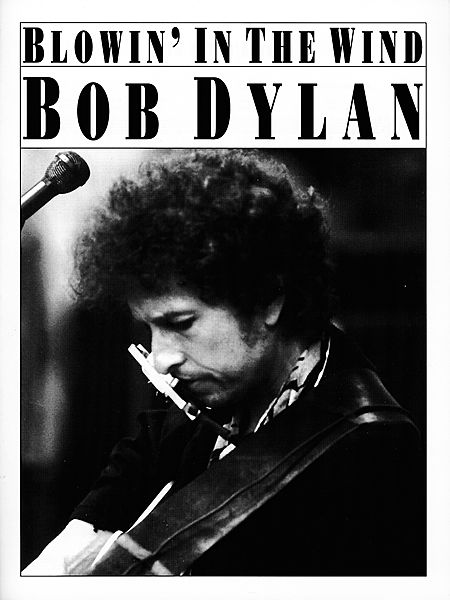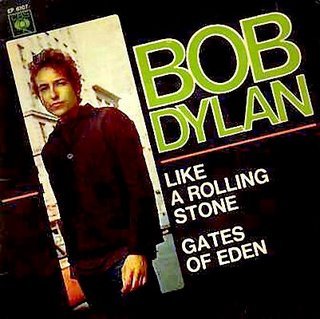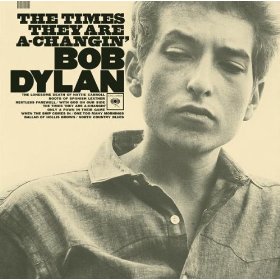BOB DYLAN AT 70. AN APPRECIATION

BOB DYLAN AT 70. AN APPRECIATION |
|
No timeline on the mythic decade that was the 1960’s would be complete without acknowledging the influence of Bob Dylan. While people can (and should) debate whether Dylan or the Beatles played the stronger and more lasting role in shaping pop culture, even those favoring the Beatles would be forced to acknowledge that Dylan had as much, if not more, of a musical impact on the Beatles than vice versa. When Dylan first burst upon the folk scene in the early 60’s, many of us schooled in the lore of folk music saw him adopting the persona of his acknowledged role model, folk balladeer Woody Guthrie. It was clear—at least to me—that Dylan (né Zimmerman) was pretending to be someone that he wasn’t. The problem, of course, was that he was so good at it. No less an authority than Folklore Center owner and folk guru, Israel G. Young, said that Dylan was “so goddamn real, it’s unbelievable.”1I thought that Dylan was all too believable, and was doing a number on the elders of folk community, who saw him as the second coming of Guthrie. Just a few years later, “Sing Out” magazine (the folk music “bible”) editor, Irwin Silber wrote his famous “open letter” to Dylan, bemoaning the fact that Dylan was turning his back on (topical/political) folk music and turning inward.2 Good as Dylan was as a “protest” folksinger (a category he always rejected), the best was (very much) yet to come. As for my own youthful skepticism as to Dylan’s public face, I can now chalk much of it up to professional (or amateur) jealousy. Looking back on it almost fifty years later, I’m simply glad to be breathing the same air he does. Bob Dylan turned 70 on May 24th. As a Dylan contemporary (he’s exactly a month my senior), I’ve had the good fortune to listen to him over the years and, indeed, his music forms a backdrop to anyone who came of age in that tumultuous time. (While I’ve often explained our thirty-day age difference as the reason why his is the greater talent, I have no similar excuse for Paul Simon, who will not turn 70 until the fall.) There are many books on Dylan, including one of his own writing.3 Rather than delve into Dylanology, I am taking the easier (though still daunting) task of subjectively choosing the twenty-five of his songs that mean the most to me. In doing so, I won’t ignore the ones that enjoyed the most popularity or airplay, but I won’t choose them simply for that reason. The luxury of this, or any subjective analysis, is that it gives me the right to be wrong. There are actually some songs that did not make the list that I prefer over some that did, but I did make certain concessions to the importance or impact of a given song (over my simply liking to hear it). That said, I would apply this caveat to my compendium. I fully expect you to agree with some of my choices, and disagree with others. All I ask is that you give some thought to those of my selections that didn’t spring as quickly to your mind as they did to mine. The choices, by the way, are in no particular order, at least none that I could rationalize. What you may notice (as I certainly did) is the prodigious talent that is reflected in the Dylan catalogue, even as selectively excerpted by me. I’ve also taken the liberty of indicating my favorite recording (or performance) of each song. Die-hard Dylan aficionados often prefer his idiosyncratic renditions of his songs to any of the so-called “covers.” While no lesser a music authority than “Rolling Stone” magazine has ranked Dylan’s voice as one of the best in rock history,4 I have found his vocal gifts to be inconsistent at best. But as with good scotch, Dylan is an acquired taste, and one that I have grown to appreciate with age. 1. “Blowing in the Wind” 2. “Mr. Tambourine Man” 3. “Like a Rolling Stone”
4. “The Lonesome Death of Hattie Carroll” By the way, you may (like me) have been among those puzzled by the meaning of the lines “You who philosophize disgrace and criticize all fears…” which precede the clearer words “take the rag way from your face, now ain’t the time for your tears.” Not to worry, you’re not alone. Some years ago, while preparing the song for a show I was doing, I had a correspondence with noted “Dylanologist” Eyolf Ostrem as to the meaning of “Hattie Carroll.”10 That it is a marvelous song is one thing on which we clearly agreed. Ostrem believes that Dylan is addressing people who are “too rational” to have a true emotional response to the tragedy of Hattie Carroll’s death. If that is true, I wonder, why are they so anxious to cry? Good as Dylan is, the meanings he may or may not have intended can range from the clear to the obscure. Sometimes, lyricists just like the way things sound and “feel” to them. While people who “philosophize disgrace” may well be the thinkers who rationally expound on just what constitutes disgraceful behavior, they could also be those who rationalize the acts of others in a (too) non-judgmental manner. Which act was worse; the wanton (although not intentional) act of a rich white man whose sailing cane happens to hit and kill a poor black servant, or the judge—who speaks for society—in assessing the severity of the offense so lightly as to mete out a mere six-month sentence? While this may dispose of the “philosophizing disgrace” part, what meaning can we ascribe to the words “criticize all fears?” Here, I think Ostrem is onto something. People who criticize all fears are rational to a fault, and would seek to view prejudice rationally—i.e. fear of the different, a fear no rational, or unprejudiced person would feel. Boston University professor and poetry critic Christopher Ricks is arguably Dylan’s most fervent and distinguished academic champion. He has even authored a short book analyzing Dylan’s lyrics as a poet.11 Like Ostrem, he believes that Dylan has betrayed neither anger nor sentimentality in telling the story of Hattie Carroll’s “lonesome” death. He goes further than most in parsing Dylan’s rhymes as “masculine” or “feminine” and the pivotal verbs in the refrain (“philosophize” and “criticize”) as “intransitive” and “transitive,” respectively. I suspect that even Dylan would smile at this degree of analysis into the scanning of his verses. Be that as it may, Ricks, too, believes that Dylan is taking to task those who (in “philosophizing disgrace”) are acting dispassionately, because the events don’t really impinge on their lives. But, once again, if that were so, why would such rational people be so quick to cry? The best I can come up with to rationalize this interpretation is that Dylan may be saying to the super-rational who never know when to react emotionally, even you who philosophize…don’t cry just yet. The time will come when you can—and should—show emotion. Be that as it may, I’m willing to split the difference, and say that perhaps Dylan simply means that, while anything can be rationalized—even sentiment—sometimes we should appreciate the injustice (i.e. society’s valuing the taking of a black life by a white person less seriously than the reverse) as the real tragedy, and feel it rather than rationalize and “understand” it. I think that much of Dylan’s lyrics are meant to be felt and absorbed, rather than be analyzed too closely. This is something Messrs. Ostrem and Ricks may have been guilty of, and perhaps I run that risk as well. That said, I have devoted this much space to “Hattie Carroll,” because I think it the very best of Dylan’s “protest songs.” (I know, Bob has disavowed being a “protest” singer, but you know what I mean). He’s written some very good ones, such as “Only a Pawn in their Game,” “Long ago, far away,” “Who Killed Davey Moore?” and better known ones, like “A Hard Rain’s a-Gonna Fall,” (and, of course, “Blowing in the Wind”), but “The Lonesome Death of Hattie Carroll,” in my view, stands head and shoulders above the rest. It is wonderfully constructed and understated.
|
|
Footnotes: 1. Quotation on poster for first Dylan concert appearance in New York City. Carnegie Recital Hall, November 4, 1961.
Don’t forget to bookmark us! (CTRL-SHFT-D)
|
Stereo Times Masthead
Publisher/Founder
Clement Perry
Editor
Dave Thomas
Senior Editors
Frank Alles, Mike Girardi, Russell Lichter, Terry London, Moreno Mitchell, Paul Szabady, Bill Wells, Mike Wright, and Stephen Yan,
Current Contributors
David Abramson, Tim Barrall, Dave Allison, Ron Cook, Lewis Dardick, John Hoffman, Dan Secula, Don Shaulis, Greg Simmons, Eric Teh, Greg Voth, Richard Willie, Ed Van Winkle, Rob Dockery, Richard Doran, and Daveed Turek
Site Management Clement Perry
Ad Designer: Martin Perry


 While hardly the first song written by Dylan, this 1962 folk anthem is arguably his most famous and influential. The authenticity of its provenance was doubted from the outset. Newsweek Magazine questioned its authorship, and many found “proof” of this when Dylan included the old Negro spiritual “No More Auction Block” in his “Biograph” Box Set.
While hardly the first song written by Dylan, this 1962 folk anthem is arguably his most famous and influential. The authenticity of its provenance was doubted from the outset. Newsweek Magazine questioned its authorship, and many found “proof” of this when Dylan included the old Negro spiritual “No More Auction Block” in his “Biograph” Box Set. This was Dylan’s first big hit as a singer. While “Mr. Tambourine Man” struck first, it was the Byrds’s iconic rendition that first charted. Here, the Dylan version was the hit, and was about as original a number as I’d ever heard. While clearly rock n’ roll, it was a far cry from not only “doo wop,” but of anything that came before. And once it hit, nothing was the same. In one of Dylan’s best interviews (with Playboy’s Ron Rosenbaum), Dylan identified the sound best captured on “Bringing it All Back Home,” and “Highway 61 Revisited” as that “thin, that wild mercury sound.”
This was Dylan’s first big hit as a singer. While “Mr. Tambourine Man” struck first, it was the Byrds’s iconic rendition that first charted. Here, the Dylan version was the hit, and was about as original a number as I’d ever heard. While clearly rock n’ roll, it was a far cry from not only “doo wop,” but of anything that came before. And once it hit, nothing was the same. In one of Dylan’s best interviews (with Playboy’s Ron Rosenbaum), Dylan identified the sound best captured on “Bringing it All Back Home,” and “Highway 61 Revisited” as that “thin, that wild mercury sound.” my view, the kind of song that set him apart from his many peers. There were other singer/songwriters on the folk scene at the same time Dylan made his own presence felt. Among the best were Tom Paxton and (the late) Phil Ochs. While both were (and Paxton, who is still writing and performing, still is), very talented artists, songs such as “Hattie Carroll” raised the bar to that of a higher art form. Rather than simply write about (an) injustice, Dylan chose to tell this (mostly true) story from the perspective of the well-meaning liberals who are prepared to shed their tears over this senseless tragedy he is describing. Slowly building his story of wealth and privilege as contrasted with the have-nots who wait upon them, Dylan cautioned his audience, “now ain’t the time for your tears,” even as he made his (mounting) case. Finally, when the judge (in his “courtroom of honor”) hands down his sentence of six-months to the man who had “killed for no reason, who just happened to feel that way without warning,” the listeners feel as if we’ve been kicked in the stomach. Now, Dylan tells us, “bury the rag deep in your face, now is the time for your tears.” While Dylan never wanted to be regarded as a “protest singer” (even when he was considered one), this remains, in my view, the best song of that type ever written.
my view, the kind of song that set him apart from his many peers. There were other singer/songwriters on the folk scene at the same time Dylan made his own presence felt. Among the best were Tom Paxton and (the late) Phil Ochs. While both were (and Paxton, who is still writing and performing, still is), very talented artists, songs such as “Hattie Carroll” raised the bar to that of a higher art form. Rather than simply write about (an) injustice, Dylan chose to tell this (mostly true) story from the perspective of the well-meaning liberals who are prepared to shed their tears over this senseless tragedy he is describing. Slowly building his story of wealth and privilege as contrasted with the have-nots who wait upon them, Dylan cautioned his audience, “now ain’t the time for your tears,” even as he made his (mounting) case. Finally, when the judge (in his “courtroom of honor”) hands down his sentence of six-months to the man who had “killed for no reason, who just happened to feel that way without warning,” the listeners feel as if we’ve been kicked in the stomach. Now, Dylan tells us, “bury the rag deep in your face, now is the time for your tears.” While Dylan never wanted to be regarded as a “protest singer” (even when he was considered one), this remains, in my view, the best song of that type ever written. 



Be the first to comment on: BOB DYLAN AT 70. AN APPRECIATION